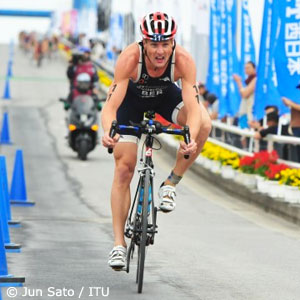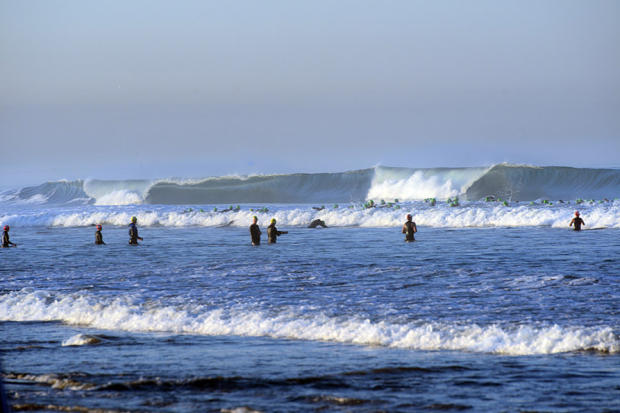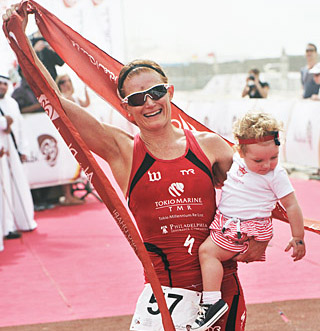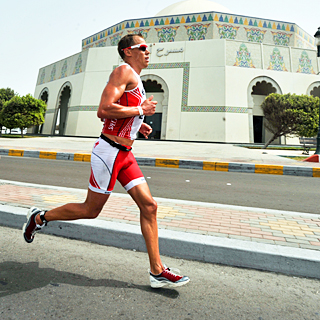Up close with Tyler Butterfield

Tyler Butterfield has raced many endurance sports over the past decade and while the events he has raced have varied, one thing has remained the same, his supreme cycling skills. Tyler raced in the Athens Olympics and then put his triathlon career on hiatus to compete as a professional cyclist in Europe. He then came back to triathlon to compete in the London Games where he finished 34th and recorded the fastest bike split. Recently Tyler announced will be competing in 70.3 and Ironman races in 2013.
Slowtwitch: Your accent caught me off guard.
Tyler Butterfield: Yes I’m quite a mix. I’m from Bermuda and I have lived in Australia for 3 years or so, France for 2 years, Spain for 2 years and my wife is Australian too. Plus my mom is American and we live in Boulder, Colorado now.
ST: So coming from Bermuda, a very small island nation, are you kind of a big deal?
Tyler: I’ve been in the papers since I was a teenager, but that was also because my mom and dad were good at sports too. My mom was a marathon runner and my dad was from the old-school Ironman era and also went to the Olympics for Rowing, so everyone kind of just expected my brother and I to be good athletes. In Bermuda my dad was sometimes called "Ironman" or "Iron Jim." My parents started or foundered the Bermuda Triathlon Association and the Road Running club too. Before them and their peers at that time, running and triathlon were almost non-existent in Bermuda. Once or twice my mom was running and people would stop and ask if she needed a lift.
ST: Have you ever biked the entire island?
Tyler: Bermuda is a thin U shape (the widest point is 3km wide) and to ride the whole U with a few side out-and-backs is about 3.5 hours, so yes, I ride the whole island a lot while I am there if training hard.
ST: How much time do you get to spend in Bermuda nowadays?
Tyler: We usually get back a couple of times a year, although when we were living in Europe it was much less. Now with my daughter Savana almost 2 and living in the US we make much more of an effort to get back. It’s important for Savana to know her extended family, and now my friends I grew up with are starting to have kids too so my girls have a ball whenever we go back. Whenever we take a break it’s usually there. It normally adds up to about 6 weeks a year.
ST: How did you meet your wife Nikki?
Tyler: Nik had just moved from Brisbane to the Gold Coast to train with the Australian National High Performance Director at the time, and I just started to train with the same group and had moved to Australia from Bermuda. We both joined around the same time. Back then we were 19 and 20 years old! We’ve been together ever since.

ST: Do you ever train together?
Tyler: Almost always when Nik is racing. She’s taking a year off right now to try for our second child, so right now she just looks after Sav and the house stuff. I tease her that she’s not working so her life is easy, but she never seems to get to sit down so maybe training is easier than being a stay-at-home Mom. On my days off, I spend most of the day with them, and lets just say kids are a handful.
ST: I heard you’re moving away from ITU racing in favor of Ironman. Why the change?
Tyler: I did long-course for the years between cycling and the 2012 Olympics, I just went back to ITU to have another shot at the Games. Coming from Bermuda it’s different, I already have a spot on the Bermuda team, the difficult thing is qualifying a place on the start line for Bermuda itself. That’s what I was doing all of last year and the first part of 2012- traveling the world collecting points to earn my country a place on the start line in London. If I got one for Bermuda, I knew it was mine. It seemed to work out.
ST: How will your workouts change?
Tyler: Swimming is still important but not as critical as for ITU. I was swimming 7 days a week leading into the Games and it was my first priority in terms of sessions. As for biking, I still rode hard but there isn’t much need to ride more than 4 hours, and I concentrated more on having the power to jump across gaps and breakaway. For non-drafting it’s all about time-trialing of course, which is strength-endurance steady-state power, not so much accelerations and sprints. In other words I do longer rides at a steadier pace, with more TT work and big-gear strength stuff. Running wise I did much more speed for ITU but for Ironman it’s more about tempo runs and volume.
ST: Do you think your powerful bike skills will translate well to a time-trial bike?
Tyler: I hope so, we’ll see, but I will have to do the TT work for the transition from ITU to non-drafting to work.

ST: As for the Olympics, are you happy with the way things went?
Tyler: Sure. Not many really understand that. My swim improved dramatically in the 12 months leading up and I hate wetsuits, so when the front guys went through the first 500m in 5 minutes, I knew I was going to be chasing! Then on the bike I was the main guy working to get my group across from group to group (I was in the 5th split out of the swim) to all but the front group which had the Brownlees, Stuart Hayes working for them and guys like Gomez all pulling through. There was definitely less cohesion in the guys I was riding with. With 5km to go I rode off the front, I didn’t even really attack intentionally, no one wanted to pull through so a gap opened up and I just went with it. It gave me 20 second or so buffer over the guys off the bike, which was nice. I wasn’t there to fight over 30th place. I was going to chase hard till we caught up or the bike was over, which ever came first! Then I ran faster than a lot of the guys that were sitting in when I rode as hard as I could. I did all that I could do. A one point on the bike I could feel the lactate and thought "you’re going to run like crap Ty" but it is the Olympics and we were behind. That means one thing – chase! It was simple and I gave everything, so that is way I can walk away happy.
ST: With your reputation as a fervid cyclist, did you find that others were expecting you to do most of the chasing?
Tyler: Maybe that’s why only a few people would work with me, but like I said, who cares about 30th place? It’s much better when everyone works together and at least then if you catch up you’re racing where it matters. Even if for only a few minutes, at least you are back in the race.
ST: Do you think your group could have caught had Stuart Hayes not been in the race?
Tyler: It might have helped since his race was all about looking after Alistair and Johnny, but if he wasn’t there I think the Brownlees would have just taken more pulls and the outcome would probably have been the same. It was the best triathlon I’ve seen to date.
ST: How much time did you have on the chase group when they let you get ahead and did that help you in the grand scheme of the race?
Tyler: About 20 seconds. It wasn’t so much to breakaway; it was a sign of defiance. They wouldn’t work with me well and I wasn’t scared of the run, or to lay everything down!
ST: What was your pro cycling career like?
Tyler: I rode for the French Amateur Team Vendee U in 2005 and 2006, and then Slipstream Pro Team (now Garmin) in 2007, then I went back to Vendee U for my last year cycling in 2008. I was always nervous in the bunch so I’d usually be in breakaways (in the Amateur ranks), often with other teammates that were stronger or better sprinters than me so I’d cover more of the attacks for them, which often meant I’d set my team-mate up for the win, but it also meant sometimes the attacks I’d cover would stay away so I got a couple of wins too. I only rode pro for 1 year as I had a shocking year in 2007 and got dropped from the team. I found at the end of the year I’d been racing with the parasite Giardia, which makes you super-tired, but I thought it was just from trying to step-up to the pro level so I didn’t get checked out. I have great memories and some funny stories and times riding in Europe, most of them on my French Amateur team. I was the only non-French rider there for the year, and some of the guys became great friends, but we laughed at each other for the different culture habits we had. My favorite races were U23 Paris–Roubaix and Flanders. I watch videos of those races in the local Bermuda bike shop I worked in as a teenager and I never thought I would race them. It wasn’t the pro race, but the 180km U23 World Cup races were fast! Also a lot of big pro names now in the pro peloton I got to race as they came through French amateur racing at that time.

ST: I noticed that Philadelphia Insurance is one of your supporters. I don’t often see insurance companies and endurance athletes forming relationships.
Tyler: I’m fortunate coming from Bermuda Insurance and Reinsurance is the biggest industry there, so when I go out for a local ride I might be riding next to the CEO of a worldwide Reinsurance Company. Tokio Millennium Re my major sponsor acquired Philadelphia Insurance Companies so it is kid of a joint sponsorship between the two companies. Philadelphia Insurance Companies is a company very focused on fitness so it also fits with their philosophies too. Both companies are incredible sponsors and it is amazing to see the value these companies put on health and fitness. Everyone that works at Tokio Re and Philadelphia Insurance stays fit and is thankful for the companies input to their well being. They really are great companies to be associated with and it is an honor to be sponsored by both Tokio Millennium Re and Philadelphia Insurance Companies.
ST: What are your immediate travel and racing plans?
Tyler: With Arizona IM coming up I need to make sure I get a lot of time in on the bike and it’s just started snowing here in Boulder. I’m entered for Texas 70.3 the week after but I’ll book my tickets late depending on how the training camp in Kona goes, then onto Arizona IM. From there we’re taking a break in Bermuda with my family from Thanksgiving on for a few weeks, then Nik’s family comes to Boulder for Christmas.
ST: Thanks and good luck!
Tyler: Cheers.
Tyler and his wife Nikki keep their fans updated at www.butterfieldracing.com




